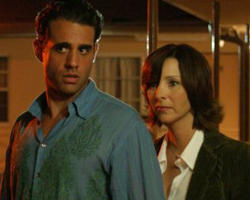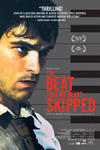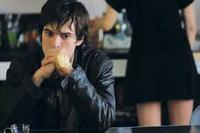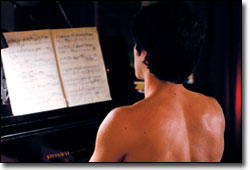Saturday at the Cinema—Art Imitates Life in Two of the Summer's Acclaimed Films
In the 1991 film Postcards from the Edge, Meryl Streep plays Suzanne Vale, a middle-aged actress who is grasping at rope ends to pull herself back to reality following a near fatal drug overdose. The film chronicles her attempts to revive a movie career and the obstacles—lingering resentment towards her alcoholic mother, a deceptive lover, a critical director, and an embezzling business manger among them—that conspire to derail her sobriety. "Thank God I got sober now so I can be hyperconscious for this series of humiliations," she says. Later, she confides to a director friend, played by Gene Hackman, "I don't want life to imitate art. I want life to be art."
Two of this summer's art house films—Don Roos's much-anticipated Happy Endings and French director Jacques Audiard's critic's-choice The Beat That My Heart Skipped—somewhat eclipsed in scale by a raft of flashy blockbusters—reminded me of why I'm drawn to small films. The main reason: their greatest sparks come not from computer generated special effects but from the collision of well-meaning yet wounded characters trying desperately to reconcile their brokenness. These kinds of films are pieces of art; art reflecting real-life struggles and revealing the lengths we go to wrestle those struggles into submission.
A lot of us go to movies to escape reality. In that regard, aliens are handy devices to reach that goal. Any of George Lucas's most recent creations work well too. When was the last time you saw an alien have a psychological meltdown after discovering his lover was unfaithful? Or one torn between the demands of a going-nowhere job and the opportunity to chase a dream? The beauty of escape in the experience of an alien (War of the Worlds), caped crusader (Batman Begins), or megalomaniacal chocolatier (Charlie and the Chocolate Factory) is that the realms those characters inhabit in no way resemble the numbing sameness of our daily lives. I'm not against those kinds of movies. In fact, I've found many of them to be a lot of fun. Whenever I come across an HBO replay of Charlie's Angels: Full Throttle, for instance, I allow myself to become fully immersed in the glamour of three of the sexiest angels we're bound to see mingling among us on terra firma.
What I find especially satisfying, however, is watching the product of a talented director and his cadre of writer, editor, photographer, and actors after they have articulated and navigated the sameness of real life on film. After all the episodes that unfold in Roos's Happy Endings and Audiard's The Beat That My Heart Skipped, while fiction, are obviously informed by emotions and experiences we can all recognize and identify with. These two directors have refracted the experience of real-life dilemmas through the medium of film. Actually, the only "real-life" things missing in these films are the mundane moments involving laundry, taking out the trash, pulling weeds, and sleeping. What everybody's life needs is a good screenwriter and editor.
In Happy Endings, each character inhabits a house of cards, or resides a bit too close for comfort to one that's about to topple. The fun of the movie is watching how the characters navigate the implosions. In this film everybody has a secret that triggers a collapse of some sort.
 About twenty years ago, Mamie (Lisa Kudrow) and her stepbrother Charley (Steve Coogan) had sex, which resulted in Mamie's pregnancy. Unbeknownst to everybody, she gave the baby—a son—up for adoption, even though she claimed to have had an abortion. Nicky (Jesse Bradford), an aspiring filmmaker with a mysterious link to Mamie, has uncovered her secret, and threatens to tell all if she doesn't agree to make the reunion with her son the subject of a documentary. Instead, Mamie persuades Nicky to make the story of Javier (Bobby Cannavale), her boyfriend and a masseur who is also an immigrant from Mexico, the subject of his documentary. Mamie and Javier convince Nicky that the massage business is really a front for Javier's more lucrative sex business. Enlisting one of his regular massage clients, a very beautiful woman with her own curious connection to Javier, in the making of the documentary, soon Mamie, Javier, and Nicky are in business. In exchange for the documentary, Mamie will get access to information about her son's name and whereabouts from Nicky.
About twenty years ago, Mamie (Lisa Kudrow) and her stepbrother Charley (Steve Coogan) had sex, which resulted in Mamie's pregnancy. Unbeknownst to everybody, she gave the baby—a son—up for adoption, even though she claimed to have had an abortion. Nicky (Jesse Bradford), an aspiring filmmaker with a mysterious link to Mamie, has uncovered her secret, and threatens to tell all if she doesn't agree to make the reunion with her son the subject of a documentary. Instead, Mamie persuades Nicky to make the story of Javier (Bobby Cannavale), her boyfriend and a masseur who is also an immigrant from Mexico, the subject of his documentary. Mamie and Javier convince Nicky that the massage business is really a front for Javier's more lucrative sex business. Enlisting one of his regular massage clients, a very beautiful woman with her own curious connection to Javier, in the making of the documentary, soon Mamie, Javier, and Nicky are in business. In exchange for the documentary, Mamie will get access to information about her son's name and whereabouts from Nicky.
 Across town, Charley and his same-sex partner Gil (David Sutcliffe) are going through mental contortions trying to figure out if Gil's best friend Pam (Laura Dern) and her lesbian life partner lied about using Gil's sperm to have their son. Charley is convinced, based on similarities between Gil's baby pictures and those of Pam's son, that the young boy is in fact Gil's son also. Charley convinces Gil that the two women lied about the viability of Gil's sperm so that they wouldn't have to share custody with the two men. Confused yet? Well, strap yourself in because the plot takes some interesting and unexpected turns. This film is alive with brilliant performances by Maggie Gyllenhaal, Tom Arnold, and Jason Ritter weaving rich narratives and creating a nuanced and lively ensemble piece. Maggie Gyllenhaal is particularly remarkable as Jude, a free-spirited and irresistibly sexy opportunist who first seduces Otis (Ritter), a sexually ambivalent drummer in a rock band, then Otis's dad Frank (Arnold), a gullible and trusting middle-aged widower. Gyllenhaal's plaintive singing wafts through the film. Her performance is a revelation.
Across town, Charley and his same-sex partner Gil (David Sutcliffe) are going through mental contortions trying to figure out if Gil's best friend Pam (Laura Dern) and her lesbian life partner lied about using Gil's sperm to have their son. Charley is convinced, based on similarities between Gil's baby pictures and those of Pam's son, that the young boy is in fact Gil's son also. Charley convinces Gil that the two women lied about the viability of Gil's sperm so that they wouldn't have to share custody with the two men. Confused yet? Well, strap yourself in because the plot takes some interesting and unexpected turns. This film is alive with brilliant performances by Maggie Gyllenhaal, Tom Arnold, and Jason Ritter weaving rich narratives and creating a nuanced and lively ensemble piece. Maggie Gyllenhaal is particularly remarkable as Jude, a free-spirited and irresistibly sexy opportunist who first seduces Otis (Ritter), a sexually ambivalent drummer in a rock band, then Otis's dad Frank (Arnold), a gullible and trusting middle-aged widower. Gyllenhaal's plaintive singing wafts through the film. Her performance is a revelation.
In the end, Roos deftly closes each character's story with, well, a happy ending. Without irony or sentimentality, each ending reveals the strangeness, serendipity, and beauty we often encounter in real-life itself.
 Roman Duris plays Tom, the beautiful and broken protagonist, in Jacques Audiard's The Beat That My Heart Skipped. Tom wears his struggles on his sleeve. As a result we witness all his disappointments, hopes, and terrors as if from inside his skin. Frustration, anger, exhilaration—when he experiences them they first simmer and rise out of him almost immediately. The only character unflappable in his presence is a Chinese pianist he hires to prep him for an important audition.
Roman Duris plays Tom, the beautiful and broken protagonist, in Jacques Audiard's The Beat That My Heart Skipped. Tom wears his struggles on his sleeve. As a result we witness all his disappointments, hopes, and terrors as if from inside his skin. Frustration, anger, exhilaration—when he experiences them they first simmer and rise out of him almost immediately. The only character unflappable in his presence is a Chinese pianist he hires to prep him for an important audition.
 Tom's real struggle is in resolving his conflicting desires. He desperately wants to resurrect his youthful talent as a promising pianist, following in his mother's celebrated musical footsteps. He also wants to help his father, a businessman with dubious ethics. Tom is determined to do everything he can to protect his father from what we know is his inevitable destruction. Tom's interventions in his father's failed business partnerships very nearly bring him close to his own end.
Tom's real struggle is in resolving his conflicting desires. He desperately wants to resurrect his youthful talent as a promising pianist, following in his mother's celebrated musical footsteps. He also wants to help his father, a businessman with dubious ethics. Tom is determined to do everything he can to protect his father from what we know is his inevitable destruction. Tom's interventions in his father's failed business partnerships very nearly bring him close to his own end.
 Some of the film's most beautiful scenes are those that capture Tom expressing his musical talent on an invisible keyboard and those between him and his steel-willed piano coach played by Linh Dah-Phan. Duris's sister, a concert pianist herself, for his role, tutored him. When Tom plays the piano it is both mesmerizing and heartbreaking. He wants so much to use the piano to impose a sense of control and equilibrium on his life. Nothing about this character suggests he will be successful filling his life only with the beauty of music. We know, just as he must suspect himself, that any efforts to release him from violence are futile. Tom will have brushes with tranquility, but they will be occasional and fleeting.
Some of the film's most beautiful scenes are those that capture Tom expressing his musical talent on an invisible keyboard and those between him and his steel-willed piano coach played by Linh Dah-Phan. Duris's sister, a concert pianist herself, for his role, tutored him. When Tom plays the piano it is both mesmerizing and heartbreaking. He wants so much to use the piano to impose a sense of control and equilibrium on his life. Nothing about this character suggests he will be successful filling his life only with the beauty of music. We know, just as he must suspect himself, that any efforts to release him from violence are futile. Tom will have brushes with tranquility, but they will be occasional and fleeting.
Happy Endings and The Beat That My Heart Skipped ought to restore your faith in fine filmmaking during a season when the best thing about what’s playing on most screens is the certainty of sitting in the comfort of an air-conditioned multiplex theater.
In the 1991 film Postcards from the Edge, Meryl Streep plays Suzanne Vale, a middle-aged actress who is grasping at rope ends to pull herself back to reality following a near fatal drug overdose. The film chronicles her attempts to revive a movie career and the obstacles—lingering resentment towards her alcoholic mother, a deceptive lover, a critical director, and an embezzling business manger among them—that conspire to derail her sobriety. "Thank God I got sober now so I can be hyperconscious for this series of humiliations," she says. Later, she confides to a director friend, played by Gene Hackman, "I don't want life to imitate art. I want life to be art."
Two of this summer's art house films—Don Roos's much-anticipated Happy Endings and French director Jacques Audiard's critic's-choice The Beat That My Heart Skipped—somewhat eclipsed in scale by a raft of flashy blockbusters—reminded me of why I'm drawn to small films. The main reason: their greatest sparks come not from computer generated special effects but from the collision of well-meaning yet wounded characters trying desperately to reconcile their brokenness. These kinds of films are pieces of art; art reflecting real-life struggles and revealing the lengths we go to wrestle those struggles into submission.
A lot of us go to movies to escape reality. In that regard, aliens are handy devices to reach that goal. Any of George Lucas's most recent creations work well too. When was the last time you saw an alien have a psychological meltdown after discovering his lover was unfaithful? Or one torn between the demands of a going-nowhere job and the opportunity to chase a dream? The beauty of escape in the experience of an alien (War of the Worlds), caped crusader (Batman Begins), or megalomaniacal chocolatier (Charlie and the Chocolate Factory) is that the realms those characters inhabit in no way resemble the numbing sameness of our daily lives. I'm not against those kinds of movies. In fact, I've found many of them to be a lot of fun. Whenever I come across an HBO replay of Charlie's Angels: Full Throttle, for instance, I allow myself to become fully immersed in the glamour of three of the sexiest angels we're bound to see mingling among us on terra firma.
What I find especially satisfying, however, is watching the product of a talented director and his cadre of writer, editor, photographer, and actors after they have articulated and navigated the sameness of real life on film. After all the episodes that unfold in Roos's Happy Endings and Audiard's The Beat That My Heart Skipped, while fiction, are obviously informed by emotions and experiences we can all recognize and identify with. These two directors have refracted the experience of real-life dilemmas through the medium of film. Actually, the only "real-life" things missing in these films are the mundane moments involving laundry, taking out the trash, pulling weeds, and sleeping. What everybody's life needs is a good screenwriter and editor.
In Happy Endings, each character inhabits a house of cards, or resides a bit too close for comfort to one that's about to topple. The fun of the movie is watching how the characters navigate the implosions. In this film everybody has a secret that triggers a collapse of some sort.
 About twenty years ago, Mamie (Lisa Kudrow) and her stepbrother Charley (Steve Coogan) had sex, which resulted in Mamie's pregnancy. Unbeknownst to everybody, she gave the baby—a son—up for adoption, even though she claimed to have had an abortion. Nicky (Jesse Bradford), an aspiring filmmaker with a mysterious link to Mamie, has uncovered her secret, and threatens to tell all if she doesn't agree to make the reunion with her son the subject of a documentary. Instead, Mamie persuades Nicky to make the story of Javier (Bobby Cannavale), her boyfriend and a masseur who is also an immigrant from Mexico, the subject of his documentary. Mamie and Javier convince Nicky that the massage business is really a front for Javier's more lucrative sex business. Enlisting one of his regular massage clients, a very beautiful woman with her own curious connection to Javier, in the making of the documentary, soon Mamie, Javier, and Nicky are in business. In exchange for the documentary, Mamie will get access to information about her son's name and whereabouts from Nicky.
About twenty years ago, Mamie (Lisa Kudrow) and her stepbrother Charley (Steve Coogan) had sex, which resulted in Mamie's pregnancy. Unbeknownst to everybody, she gave the baby—a son—up for adoption, even though she claimed to have had an abortion. Nicky (Jesse Bradford), an aspiring filmmaker with a mysterious link to Mamie, has uncovered her secret, and threatens to tell all if she doesn't agree to make the reunion with her son the subject of a documentary. Instead, Mamie persuades Nicky to make the story of Javier (Bobby Cannavale), her boyfriend and a masseur who is also an immigrant from Mexico, the subject of his documentary. Mamie and Javier convince Nicky that the massage business is really a front for Javier's more lucrative sex business. Enlisting one of his regular massage clients, a very beautiful woman with her own curious connection to Javier, in the making of the documentary, soon Mamie, Javier, and Nicky are in business. In exchange for the documentary, Mamie will get access to information about her son's name and whereabouts from Nicky. Across town, Charley and his same-sex partner Gil (David Sutcliffe) are going through mental contortions trying to figure out if Gil's best friend Pam (Laura Dern) and her lesbian life partner lied about using Gil's sperm to have their son. Charley is convinced, based on similarities between Gil's baby pictures and those of Pam's son, that the young boy is in fact Gil's son also. Charley convinces Gil that the two women lied about the viability of Gil's sperm so that they wouldn't have to share custody with the two men. Confused yet? Well, strap yourself in because the plot takes some interesting and unexpected turns. This film is alive with brilliant performances by Maggie Gyllenhaal, Tom Arnold, and Jason Ritter weaving rich narratives and creating a nuanced and lively ensemble piece. Maggie Gyllenhaal is particularly remarkable as Jude, a free-spirited and irresistibly sexy opportunist who first seduces Otis (Ritter), a sexually ambivalent drummer in a rock band, then Otis's dad Frank (Arnold), a gullible and trusting middle-aged widower. Gyllenhaal's plaintive singing wafts through the film. Her performance is a revelation.
Across town, Charley and his same-sex partner Gil (David Sutcliffe) are going through mental contortions trying to figure out if Gil's best friend Pam (Laura Dern) and her lesbian life partner lied about using Gil's sperm to have their son. Charley is convinced, based on similarities between Gil's baby pictures and those of Pam's son, that the young boy is in fact Gil's son also. Charley convinces Gil that the two women lied about the viability of Gil's sperm so that they wouldn't have to share custody with the two men. Confused yet? Well, strap yourself in because the plot takes some interesting and unexpected turns. This film is alive with brilliant performances by Maggie Gyllenhaal, Tom Arnold, and Jason Ritter weaving rich narratives and creating a nuanced and lively ensemble piece. Maggie Gyllenhaal is particularly remarkable as Jude, a free-spirited and irresistibly sexy opportunist who first seduces Otis (Ritter), a sexually ambivalent drummer in a rock band, then Otis's dad Frank (Arnold), a gullible and trusting middle-aged widower. Gyllenhaal's plaintive singing wafts through the film. Her performance is a revelation. In the end, Roos deftly closes each character's story with, well, a happy ending. Without irony or sentimentality, each ending reveals the strangeness, serendipity, and beauty we often encounter in real-life itself.
 Roman Duris plays Tom, the beautiful and broken protagonist, in Jacques Audiard's The Beat That My Heart Skipped. Tom wears his struggles on his sleeve. As a result we witness all his disappointments, hopes, and terrors as if from inside his skin. Frustration, anger, exhilaration—when he experiences them they first simmer and rise out of him almost immediately. The only character unflappable in his presence is a Chinese pianist he hires to prep him for an important audition.
Roman Duris plays Tom, the beautiful and broken protagonist, in Jacques Audiard's The Beat That My Heart Skipped. Tom wears his struggles on his sleeve. As a result we witness all his disappointments, hopes, and terrors as if from inside his skin. Frustration, anger, exhilaration—when he experiences them they first simmer and rise out of him almost immediately. The only character unflappable in his presence is a Chinese pianist he hires to prep him for an important audition. Tom's real struggle is in resolving his conflicting desires. He desperately wants to resurrect his youthful talent as a promising pianist, following in his mother's celebrated musical footsteps. He also wants to help his father, a businessman with dubious ethics. Tom is determined to do everything he can to protect his father from what we know is his inevitable destruction. Tom's interventions in his father's failed business partnerships very nearly bring him close to his own end.
Tom's real struggle is in resolving his conflicting desires. He desperately wants to resurrect his youthful talent as a promising pianist, following in his mother's celebrated musical footsteps. He also wants to help his father, a businessman with dubious ethics. Tom is determined to do everything he can to protect his father from what we know is his inevitable destruction. Tom's interventions in his father's failed business partnerships very nearly bring him close to his own end.  Some of the film's most beautiful scenes are those that capture Tom expressing his musical talent on an invisible keyboard and those between him and his steel-willed piano coach played by Linh Dah-Phan. Duris's sister, a concert pianist herself, for his role, tutored him. When Tom plays the piano it is both mesmerizing and heartbreaking. He wants so much to use the piano to impose a sense of control and equilibrium on his life. Nothing about this character suggests he will be successful filling his life only with the beauty of music. We know, just as he must suspect himself, that any efforts to release him from violence are futile. Tom will have brushes with tranquility, but they will be occasional and fleeting.
Some of the film's most beautiful scenes are those that capture Tom expressing his musical talent on an invisible keyboard and those between him and his steel-willed piano coach played by Linh Dah-Phan. Duris's sister, a concert pianist herself, for his role, tutored him. When Tom plays the piano it is both mesmerizing and heartbreaking. He wants so much to use the piano to impose a sense of control and equilibrium on his life. Nothing about this character suggests he will be successful filling his life only with the beauty of music. We know, just as he must suspect himself, that any efforts to release him from violence are futile. Tom will have brushes with tranquility, but they will be occasional and fleeting.Happy Endings and The Beat That My Heart Skipped ought to restore your faith in fine filmmaking during a season when the best thing about what’s playing on most screens is the certainty of sitting in the comfort of an air-conditioned multiplex theater.


<< Home